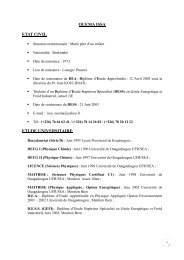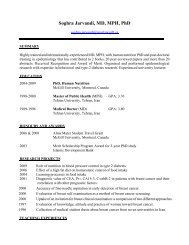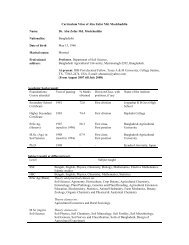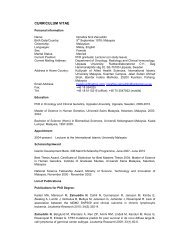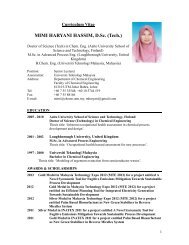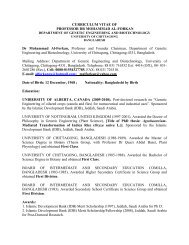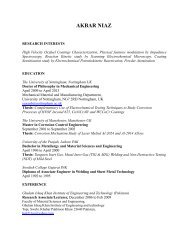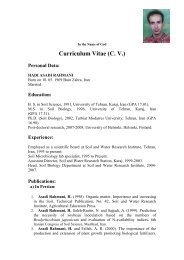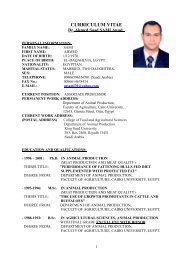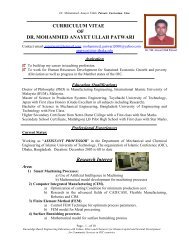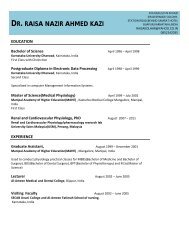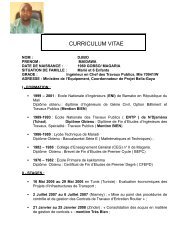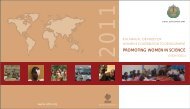Engineering: issues, challenges and opportunities for development ...
Engineering: issues, challenges and opportunities for development ...
Engineering: issues, challenges and opportunities for development ...
You also want an ePaper? Increase the reach of your titles
YUMPU automatically turns print PDFs into web optimized ePapers that Google loves.
ENGINEERING: ISSUES CHALLENGES AND OPPORTUNITIES FOR DEVELOPMENT1997), 12 13 a variety of factors are affecting engineering as awhole. Working practices are changing fast, industrial obsolescencecan occur quickly whilst over <strong>and</strong> above manufacturingis progressively becoming ‘globalized’, with demographicshifts in <strong>development</strong> <strong>and</strong> production. At the same time, whileeducational systems have become more open <strong>and</strong> diverse, theeducational levels of populations frequently do not match thetechnical changes that are occurring.We should first recognize that a student graduating with anengineering degree is far from being a fully fledged professional.Important <strong>and</strong> essential foundations have been laid,but the journey has only just begun <strong>and</strong> in this context ContinuingProfessional Development has an important role.The <strong>development</strong> of professional engineering skillsIn addition to essential technical skills, engineers are expectedto have effective communication, business <strong>and</strong> managerialskills, team working <strong>and</strong> leadership abilities, ethical <strong>and</strong> environmentalawareness, <strong>and</strong> so on. To some extent the foundation<strong>for</strong> all of these can <strong>and</strong> should be woven into the teachingcurriculum, but there are limits, exceeding which can be toomuch at the expense of technical skills, while at the same timebeing insufficient to cover any of these to a sufficient depth.While being exhorted to include a wide range of importantsubjects in the engineering curriculum, it should not be <strong>for</strong>gottenthat the key attributes of an engineer, which first <strong>and</strong><strong>for</strong>emost should be reflected in the educational process, is asound underst<strong>and</strong>ing of a technical engineering discipline <strong>and</strong>an ability to analyse, solve problems <strong>and</strong> evolve innovativesolutions in that discipline.Figure 1: Facets of engineering professionalattributesTechnicalPersonalProfessionalManagerialIt is with little difficulty that a range of key ideal attributes of aprofessional engineer can be identified. These can be groupedinto four different <strong>and</strong> general categories, which are broadlycategorized as ‘personal’, ‘technical’, ‘professional’ <strong>and</strong> ‘mana-12 Bines, H., <strong>and</strong> Watson, D. (eds). 1992. Developing Professional Education, SRHE <strong>and</strong>Open University Press, Buckingham UK. ISBN 0-355-09710-313 Burgess, R. G. (Ed). 1997. Beyond the First Degree: Graduate Education, Lifelong Learning<strong>and</strong> Careers, SRHE <strong>and</strong> Open University Press, Buckingham UK. ISBN 0-355 19976-3gerial’, as represented by the facets of a tetrahedron (Figure1). Although tempting, equal weight should not be put onthese because the importance of each characteristic can varywith the individual, the position or during a career. Howeverit is helpful in indicating that a broad range of competenciesis required in an engineer (although the word competenceshould be used with care). 14 These attributes are developed furtherin Figure 2.Figure 2: The important attributes of aprofessional engineerTechnical Ability to think mathematically, soundknowledge of appropriate basic science, goodknowledge of a specific discipline, maintenance ofcurrent knowledge <strong>and</strong> practice.Personal Ability <strong>and</strong> willingness to learn, appreciationof limits to knowledge, good communication skills,appreciation of international dimensions.Professional Commitment to high st<strong>and</strong>ards,appreciation of personal <strong>and</strong> ethical responsibilities,ability to h<strong>and</strong>le uncertainty, ability to communicateeffectively.Managerial Ability to work in a team, appreciation ofmanagement concepts <strong>and</strong> <strong>issues</strong>, ability to lead <strong>and</strong>manage personal, financial <strong>and</strong> technical resources.There is probably wide consensus on this list but when the detailof what an engineer ‘should know’ at various stages in a career isexamined, how this is to be developed <strong>and</strong> by what mechanismit should be funded this consensus starts to crumble.Limits to Professional <strong>Engineering</strong> DevelopmentThere are limits to which higher educational establishmentscan contribute to CPD appropriately <strong>and</strong> effectively. Universitiesmay not necessarily be the most appropriate place <strong>for</strong>such <strong>development</strong>s but CPD should not be viewed in isolationfrom initial education. There are moments in a career when itis more appropriate to introduce or develop specific skills thanothers. It is important to recognize this, to see the totality of thewhole <strong>and</strong> to structure educational systems to reflect this. Tosome extent this might be considered to be a very unfashionableview; today a comment heard frequently from employersis that young engineering recruits have had inadequate experienceof working in teams <strong>and</strong> communicating effectively,especially to those who have little familiarity with the workof the company or an underst<strong>and</strong>ing of how business works.Undoubtedly these are necessary <strong>and</strong> important attributes ofengineers, but these must be seen within the wider context ofthe overall technical capabilities. Whereas such sentiments can14 Barnett, R. 1994. The Limits of Competence; Knowledge, Higher Education <strong>and</strong> Society,SRHE <strong>and</strong> Open University Press, Buckingham UK. ISBN 0-355-19341-7330



